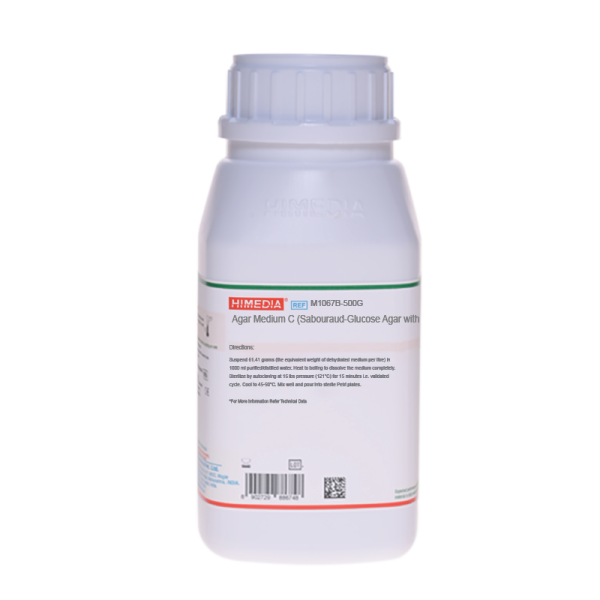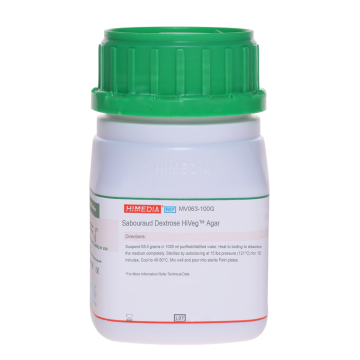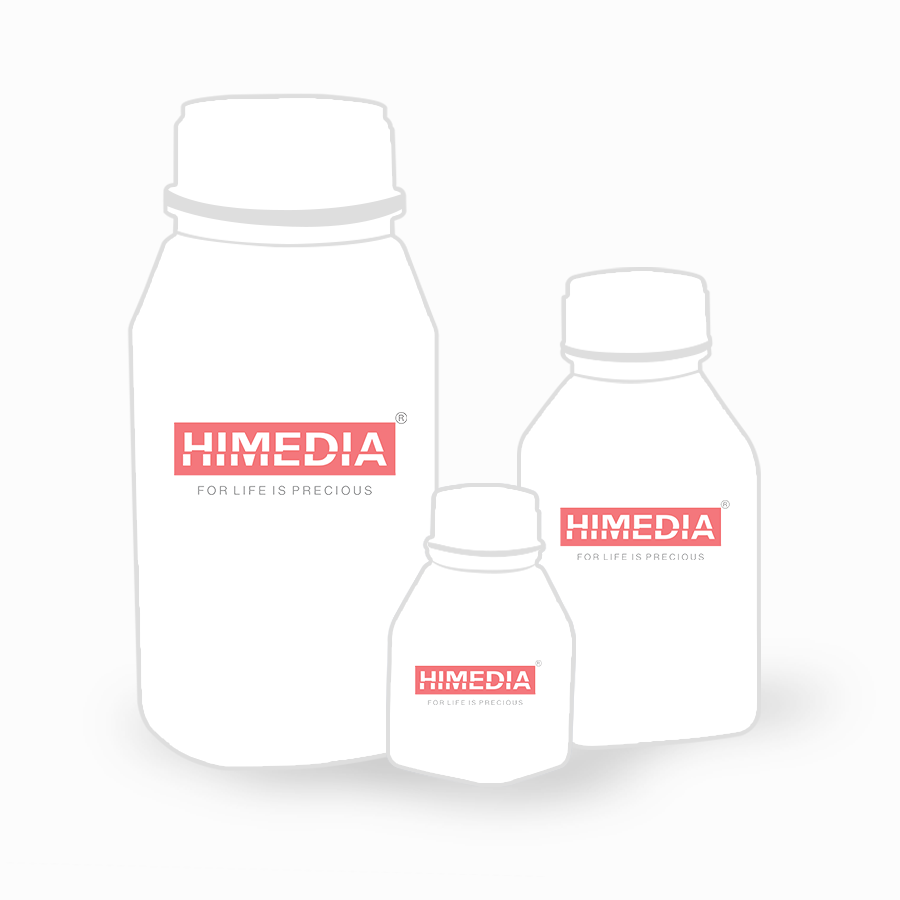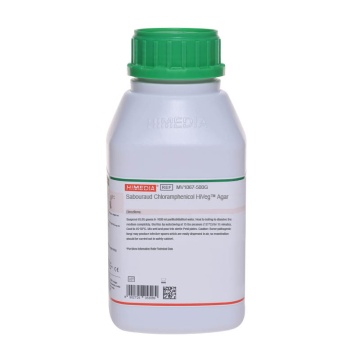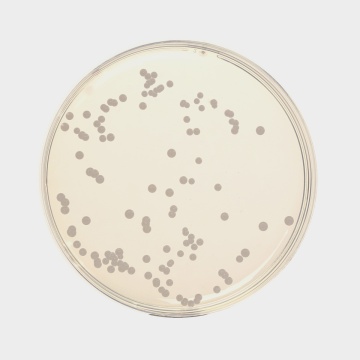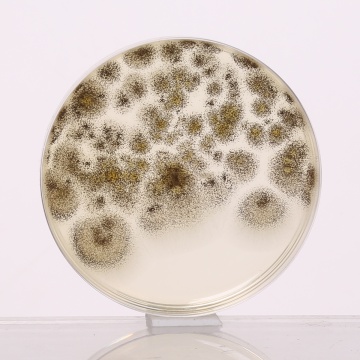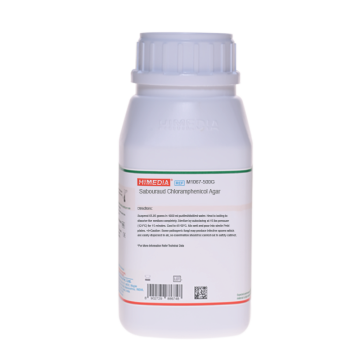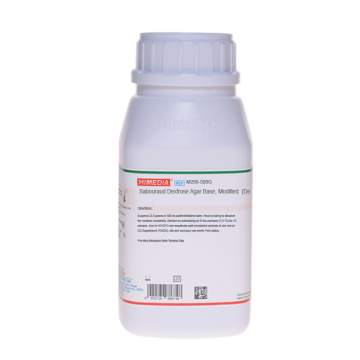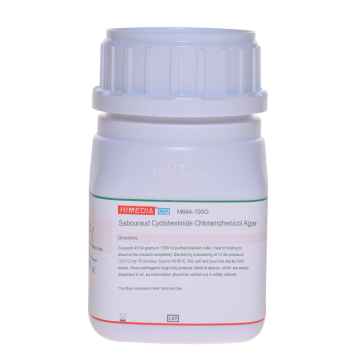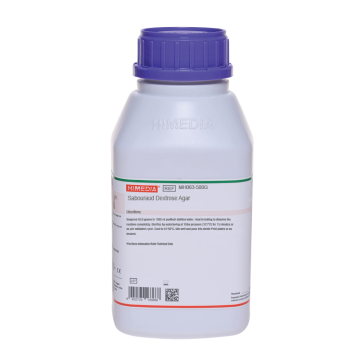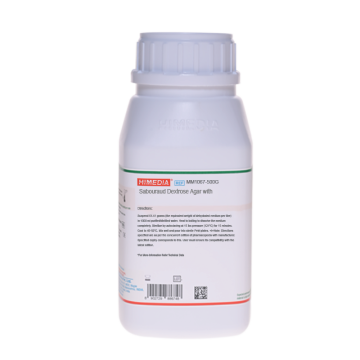 Your enquiry has been submitted
Your enquiry has been submitted
Agar Medium C (Sabouraud-Glucose Agar with Chloramphenicol)
Intended Use:
Recommended for selective cultivation of yeasts and moulds in accordance with BP.
Composition**
| Ingredients | Gms / Litre |
|---|---|
| HMC peptone # | 10.000 |
| Glucose monohydrate | 40.000 |
| Chloramphenicol | 0.050 |
| Agar | 15.000 |
Final pH (at 25°C): 5.6±0.2
**Formula adjusted, standardized to suit performance parameters
# Equivalent to Peptones (meat and casein)
Directions
Suspend 61.41 grams of dehydrated medium in 1000 ml purified / distilled water. Heat to boiling to dissolve the medium completely. Sterilize by autoclaving at 15 lbs pressure (121°C) for 15 minutes or as per validated cycle. Cool to 45-50°C. Mix well and pour into sterile Petri plates.
Principle And Interpretation
Sabouraud Glucose Agar Medium with Chloramphenicol is cited as Medium C and recommended for cultivation of yeasts and moulds by British Pharmacopoeia (2). This medium was described originally by Sabouraud (7) for the cultivation of fungi, particularly useful for the fungi associated with skin infections. The medium is often used with antibiotics such as Chloramphenicol (1) for the isolation of pathogenic fungi from materials containing large numbers of fungi or bacteria. HMC peptone provide nitrogenous compounds. Glucose monohydrate provides an energy source. Chloramphenicol inhibits a wide range of Gram-positive and Gram-negative bacteria, which makes the medium selective for fungi (5). The low pH favours fungal growth and inhibits contaminating bacteria from clinical specimens (6). Some pathogenic fungi may produce infective spores which are easily dispersed in air, so examination should be carried out in safety cabinet.
Type of specimen
Pharmaceutical samples
Specimen Collection and Handling
For pharmaceutical samples follow appropriate techniques for handling specimens as per established guidelines (2). After use, contaminated materials must be sterilized by autoclaving before discarding.
Warning and Precautions
Read the label before opening the container. Wear protective gloves/protective clothing/eye protection/ face protection. Follow good microbiological lab practices while handling specimens and culture. Standard precautions as per established guidelines should be followed while handling clinical specimens. Safety guidelines may be referred in individual safety data sheets.
Limitations
- Some pathogenic fungi may produce infective spores which are easily dispersed in air, so examination should be carried out in safety cabinet.
Performance and Evaluation
Performance of the medium is expected when used as per the direction on the label within the expiry period when stored at recommended temperature.
Quality Control
Appearance
Cream to yellow homogeneous free flowing powder
Gelling
Firm, comparable with 1.5% Agar gel
Colour and Clarity of prepared medium
Light amber coloured clear to slightly opalescent gel forms in Petri plates
pH of 6.14% w/v aqueous solution at 25°C (after sterilization).
pH
5.40-5.80
Growth Promotion Test
Cultural response was observed in accordance with BP, after an incubation at 20-25 °C for <=5 days . Recovery rate is considered as 100% for bacteria growth on Soybean Casein Digest Agar and fungus growth on Sabouraud Dextrose Agar
Cultural Response
| Organism | Inoculum (CFU) | Growth | Observed Lot value (CFU) | Recovery | Incubation temperature | Incubation period |
|---|---|---|---|---|---|---|
| Candida albicans ATCC 10231 (00054*) | 50-100 | luxuriant (white colonies) | 25-100 | >=50% | 20-25 °C | <=5 d |
| #Aspergillus brasiliensis ATCC 16404 (00053*) | 50-100 | luxuriant | 25-100 | >=50% | 20-25 °C | <=5 d |
| Candida albicans ATCC 2091 (00055*) | 50-100 | luxuriant | 25-100 | >=50% | 20-25 °C | <=5 d |
| Saccharomyces cerevisiae ATCC 9763 (00058*) | 50-100 | luxuriant | 35-100 | >=50% | 20-25 °C | <=5 d |
| Escherichia coli ATCC 25922 (00013*) | >=103 | inhibited | 0 | 0% | 20-25 °C | <=5 d |
| Escherichia coli ATCC 8739 (00012*) | >=103 | inhibited | 0 | 0% | 20-25 °C | <=5 d |
| Escherichia coli NCTC 9002 | >=103 | inhibited | 0 | 0% | 20-25 °C | <=5 d |
| Trichophyton rubrum ATCC 28191 | 50-100 | good | 20-25 °C | <=5 d | ||
| Lactobacillus casei ATCC 334 | >=103 | inhibited | 0 | 0% | 20-25 °C | <=5 d |
Key: (*) Corresponding WDCM numbers. (#) - Formely known as Aspergillus niger
Storage and Shelf Life
Store between 15-25°C in a tightly closed container and the prepared medium at 2-8°C. Use before expiry date on the label. On opening, product should be properly stored dry, after tightly capping the bottle in order to prevent lump formation due to the hygroscopic nature of the product. Improper storage of the product may lead to lump formation. Store in dry ventilated area protected from extremes of temperature and sources of ignition. Seal the container tightly after use. Product performance is best if used within stated expiry period.
Disposal
User must ensure safe disposal by autoclaving and/or incineration of used or unusable preparations of this product. Follow established laboratory procedures in disposing of infectious materials and material that comes into contact with sample must be decontaminated and disposed of in accordance with current laboratory techniques (3,4).
Reference
- Ajello L., 1957, J. Chron. Dis., 5:545.
- British Pharmacopoeia, 2016, The Stationery office British Pharmacopoeia.
- Isenberg, H.D. Clinical Microbiology Procedures Handbook 2nd Edition.
- Jorgensen, J.H., Pfaller, M.A., Carroll, K.C., Funke, G., Landry, M.L., Richter, S.S and Warnock., D.W. (2015) Manual of Clinical Microbiology, 11th Edition. Vol. 1.
- Lorian (Ed.), 1980, Antibiotics In Laboratory Medicine, Williams and Wilkins, Baltimore.
- Murray, P. R 2008, In Manual of Clinical Microbiology, 7th ed., ASM, Washington, D.C.
- Sabouraud K., 1892, Ann. Dermatol. Syphilol, 3:1061.
Disclaimer :
User must ensure suitability of the product(s) in their application prior to use. Products conform solely to the information contained in this and other related HiMedia™™ publications. The information contained in this publication is based on our research and development work and is to the best of our knowledge true and accurate. HiMedia™™ Laboratories Pvt Ltd reserves the right to make changes to specifications and information related to the products at any time. Products are not intended for human or animal or therapeutic use but for laboratory, diagnostic, research or further manufacturing use only, unless otherwise specified. Statements contained herein should not be considered as a warranty of any kind, expressed or implied, and no liability is accepted for infringement of any patents.
| Product Name | Agar Medium C (Sabouraud-Glucose Agar with Chloramphenicol) |
|---|---|
| SKU | M1067B |
| Product Type | Regular |
| Physical Form | Powder |
| Origin | Animal |
| Packaging type | HDPE |
| References | 1. Sabouraud K., 1892, Ann. Dermatol. Syphilol, 3:1061. |
| Customized Product Available | No |



